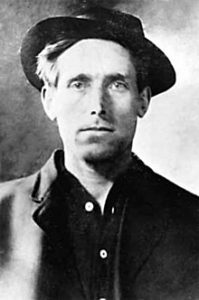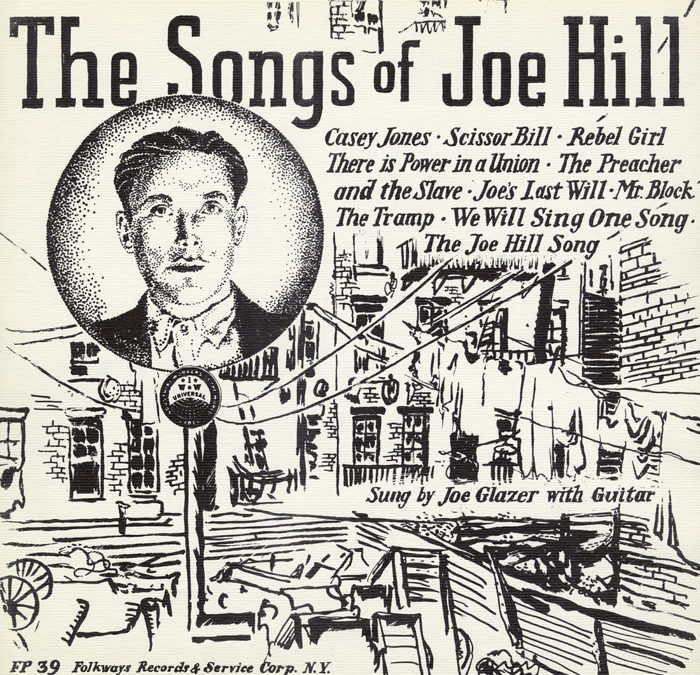Joe Hill (Gävle, Sweden, October 7, 1879 – Salt Lake City, Utah, November 19, 1915), born Joel Emmanuel Hägglund and also known as Joseph Hillström, was a Swedish-American labor activist, songwriter, and member of the Industrial Workers of the World (IWW, familiarly called the “Wobblies”). A native Swedish speaker, he learned English during the early 1900s, while working various jobs from New York to San Francisco. Hill, an immigrant worker frequently facing unemployment and underemployment, became a popular songwriter and cartoonist for the union. His most famous songs include “The Preacher and the Slave” (in which he coined the phrase “pie in the sky”), “The Tramp”, “There is Power in a Union”, “The Rebel Girl”, and “Casey Jones—the Union Scab”, which express the harsh and combative life of itinerant workers, and call for workers to organize their efforts to improve working conditions.
Hill was the author of numerous labor songs, including “The Rebel Girl,” inspired by IWW activist Elizabeth Gurley Flynn.
By this time using the name Joe or Joseph Hillstrom (possibly because of anti-union blacklisting), he joined the Industrial Workers of the World (IWW) or Wobblies around 1910, when working on the docks in San Pedro, California. In late 1910 he wrote a letter to the IWW newspaper Industrial Worker, identifying himself as a member of the IWW local chapter in Portland, Oregon.
He rose in the IWW organization and traveled widely, organizing workers under the IWW banner, writing political songs and satirical poems, and making speeches. He shortened his pseudonym to “Joe Hill” as the pen-name under which his songs, cartoons and other writings appeared. His songs frequently appropriated familiar melodies from popular songs and hymns of the time. He coined the phrase “pie in the sky”, which appeared in his song “The Preacher and the Slave” (a parody of the hymn “In the Sweet By-and-By”). Other notable songs written by Hill include “The Tramp”, “There is Power in a Union”, “The Rebel Girl”, and “Casey Jones—the Union Scab”.
[wiki] https://en.wikipedia.org/wiki/Joe_Hill
“Tie a rock on your block,” the radical union members sang fiercely, at meetings, at street rallies, on picket lines. “And then jump in the lake, kindly do that for Liberty’s sake!”
The scornful “Mr. Block” lyrics were written by Joe Hill, a Swedish immigrant who worked as a laborer around the West and became a famed songwriter for the Industrial Workers of the World, known as the Wobblies.
The union’s “songs to fan the flames of discontent,” published in its iconic Little Red Songbook, empowered workers from cultures around the globe, giving them a defiant unified voice for protest, for fellowship and for propaganda.
“What first attracted me to the IWW,” wrote early union musician Richard Brazier, “was its songs and the gusto with which its members sang them.”
Hill’s songs were simple and pointed, aimed at exposing injustice and forcing exploited workers to, in the language of today’s Black Lives Matter movement, “stay woke.” An IWW rally in Salt Lake City on Aug. 12, 1913, began with about 500 people singing “Mr. Block” at 100 South and Regent Street, across the street from what is now the Cheesecake Factory at City Creek Mall. It ended in a riot; several people were shot after security guards for Utah Copper attacked an IWW speaker.

The next day, IWW strikers were singing “Mr. Block” in the hop fields of California’s Durst Ranch. When law enforcement arrived, two workers and two county officials were killed in the confrontation.
The inciting power of Hill’s writing is what made his songs significant, said American folk singer John McCutcheon, who recently recorded an album of Hill’s IWW songs.
“‘American Idol’ is a lot of people’s entree to what it means to be a musician,” McCutcheon said. “It’s so antithetical to what Hill’s life and work was all about that I think it makes him all the more important.”


Recent Comments